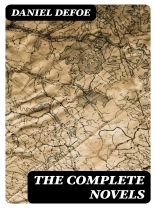Daniel Defoe’s ‘The Complete Novels’ is a masterful assemblage of works that span the early 18th century, encapsulating the transition from oral narrative traditions to the novel as a literary form. Celebrated for its realism and intricacy, Defoe’s prose employs a style marked by vivid detail and psychological depth, inviting readers into the thoughts and experiences of its characters. The collection includes iconic narratives such as ‘Robinson Crusoe, ‘ which explores themes of isolation, survival, and the human spirit, alongside lesser-known titles that reflect societal norms and economic realities of Defoe’s time, revealing the complexities of a rapidly modernizing world. Defoe, a pioneering figure in English literature, was not especially trained as a novelist but was instead a prolific writer, journalist, and political pamphleteer. His diverse experiences, including engagements in trade and a keen interest in the socio-political climate of his era, informed his storytelling. His ability to blend fiction with real-world context allowed him to capture the challenges and transformations of early modern life, contributing significantly to the novel as a genre. I highly recommend ‘The Complete Novels’ to readers who seek a rich understanding of the evolution of narrative fiction and its role in reflecting the intricacies of human experience. Defoe’s works not only entertain but provide invaluable insights into the cultural milieu of his time, making this collection a seminal addition to any literary library.
Sobre o autor
Daniel Defoe (c. 1660 – 24 April 1731) was an English writer, journalist, and pamphleteer, now most famously remembered for his novel ‘Robinson Crusoe’ (1719). Defoe is often credited with popularizing the English novel, and his work reflects a blend of realism, adventure, and social critique that was groundbreaking for its time. Born as Daniel Foe, he later added the aristocratic-sounding ‘De’ to his last name, creating the persona under which he would become known. Defoe was a prolific writer with more than 300 works to his name, ranging from political pamphlets to crime novels, reflecting his keen interest in trade, politics, and the complex social dynamics of the emerging middle class. A master of the narrative voice, Defoe had a distinctive ability to adopt various personae in his works, which allowed him to explore a multitude of perspectives and societal issues. His literary style is characterized by vivid description, memorable characters, and innovative narrative structures that often incorporated journalistic detail, making his stories both engaging and informative. ‘The Complete Novels’ of Daniel Defoe is an important collection that showcases the author’s versatility and contribution to English literature. His works have continued to be read and studied for their imaginative storytelling and historical importance. Despite being imprisoned and facing political challenges throughout his life, Defoe’s legacy as a pioneering figure in the novel form remains enduring and significant.












